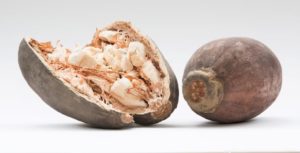
Baobab is native to Africa and is becoming more popular in other parts of the world for its sustainability. The fruit also brings economic benefits to people living in rural African communities.
Baobab’s health benefits are pretty impressive as well. The fruit has four times more potassium than a banana and six times more vitamin C than an orange. Baobab also has twice as much calcium as milk and supplies 50 percent of the body’s fiber needs. Just two tablespoons of baobab powder contains 24 percent of the recommended dietary allowance of fiber, which is 12 times more than an apple. The fiber serves as a prebiotic in the intestines and helps foster beneficial bacterial growth and boost your immune system. Prebiotics also help balance blood-sugar levels, prevent premature aging, and can be beneficial for weight management. Consuming baobab on a regular basis can also improve regularity and reduce inflammation.
The flavor of the baobab is similar to a grapefruit or pear, with hints of vanilla and caramel. This makes the fruit a pretty tasty addition to smoothies. When you buy baobab from quality sources, you’ll also provide a sustainable income source for rural African co-ops that harvest baobab from the trees that grow in their backyards.
There have also been reports that baobab helps maintain heart health. This is good news for African-Americans, who typically have higher rates of high blood pressure and heart disease than other ethnic groups. Baobab can also cleanse the liver, which can support weight-loss efforts and help with diabetes management and prevention.
Health food companies, such as the Baobab Fruit Company of Senegal, have invested in baobab and are committed to help African farmers make a sustainable living from the crop. Investing in this crop could benefit the Black community in America and serve small African communities as well.


